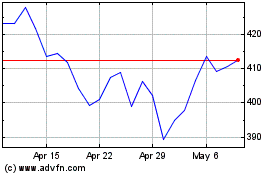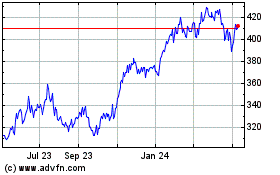By Bob Davis, Alex Leary and Kate Davidson
WASHINGTON -- President Trump said he was ready to approve a
purchase of the Chinese video-sharing app Tik Tok, but only if the
government receives "a lot of money" in exchange -- an assertion of
presidential power that appeared to lack precedent.
Microsoft Corp. said it hopes to acquire TikTok's business in
the U.S. and three other countries. Mr. Trump said he told the
company's chief executive, Satya Nadella, that "a very substantial
portion of that price is going to have to come into the Treasury of
the United States because we're making it possible for this deal to
happen."
Legal analysts and others pointed out that the White House had
been pushing for a sale of TikTok to U.S. owners, making the demand
for payment all the more extraordinary.
"It is completely unorthodox for a president to propose that the
U.S. take a cut of a business deal, especially a deal that he has
orchestrated. The idea also is probably illegal and unethical,"
said Carl Tobias, a law professor at the University of
Richmond.
While the U.S. government for decades has analyzed foreign
investments in the U.S. to see whether they could create
national-security problems, the decisions are usually left to the
members of a secretive interagency group called the Committee on
Foreign Investment in the U.S.
Under Mr. Trump, the U.S. has taken a hard line on China through
CFIUS. Last year, for instance, CFIUS ordered a Chinese company to
sell gay-dating app Grindr, citing the risk that Beijing could
exploit the personal data it collects.
Mr. Trump and his national-security team cited similar concerns
about TikTok, raising the prospect that its Chinese owner,
Beijing-based ByteDance Ltd., could be forced to share data it
collects on U.S. users with the Chinese government.
With TikTok, however, the president's requirement for a payment
showed a much greater involvement. That follows two years of
personal attention to the trade battle with China, including
deciding how and when to assess tariffs -- and when to back off and
cut a deal.
"This is an extension of Trump's generalized view that he can
micromanage the industrial sphere," said Gary Hufbauer, a senior
fellow at the Peterson Institute for International Economics.
Mr. Hufbauer said Mr. Trump's proposal reminded him of medieval
kings who oversaw salt monopolies. "If you wanted to mine some
salt, you put money into royal Treasury," he said.
The president, a former New York real-estate developer, often
presents himself as a master negotiator on everything from
international trade accords to dealings with North Korean leader
Kim Jong Un.
With TikTok, he likened his payment idea to "key money" -- or an
extra fee paid to secure a hard-to-get property. "It's a little bit
like the landlord-tenant," the GOP president said at the White
House on Monday. "Without a lease, the tenant has nothing."
"It's a great asset," Mr. Trump said of TikTok. "But it's not a
great asset in the United States unless they have the approval of
the United States."
Later in the day, he was asked to clarify his remarks. "It would
come from the sale," Mr. Trump said. "Whatever the number is, it
would come from the sale. Which nobody else would be thinking about
but me. But that's the way I think. And I think it's very
fair."
Washington's move, in the eyes of Beijing, essentially
strong-arms one of China's most valuable global tech companies into
selling a lucrative overseas unit. Chinese officials say it is
further proof that the U.S. views any Chinese tech company with
international success as a challenge to its technology primacy,
regardless of the product or how it runs its business.
Mr. Trump's comments also amplify how deeply he involves himself
in trade and investment decisions, which economic historians also
say is a big departure from the past.
Douglas Irwin, a Dartmouth College economic historian, said
early in Franklin Roosevelt's first term, his advisers debated
whether the U.S. should cut barter deals with other governments,
but the president ultimately rejected the idea and negotiated trade
agreements instead. No president since has looked to get so deeply
entwined with commercial deals with foreign companies, he said.
Tony Fratto, a former George W. Bush Treasury official and
partner at the Washington public-affairs firm Hamilton Place
Strategies, said it was unlikely any payment would stand up.
"There is no situation where either Microsoft or the Chinese or
TikTok or ByteDance will be sending a check to the U.S. government,
except in the normal course of their regular tax obligations," Mr.
Fratto said.
The president also often made broad assertions of presidential
power, which may be popular with his political base, only to back
off later. In August, 2019, at the height of the U.S.-China trade
battle, he tweeted that he "hereby ordered (U.S. companies) to
immediately start looking for an alternative to China, including
bringing your companies HOME." Nothing came of that.
This year, Mr. Trump said he had the power to force states to
reopen their economies amid the coronavirus pandemic, though he
backed off that claim, too. He has recently pointed to a Supreme
Court decision on an immigration program for young undocumented
residents, arguing that it gives him authority to make more
sweeping changes without Congress. He cited the same decision as
grounds for a health-care overhaul, though he has yet to offer
one.
"Trump often tries to prove how strong he is by taking novel and
extreme positions," said Alex Conant, a Republican strategist in
Washington. "A lot of people in Washington may roll their eyes at
Trump's off-the-wall proposals, but we shouldn't underestimate
their simplistic appeal to many voters."
The comments, though, can make life tough for companies, which
don't want problems in Washington.
In this case, Microsoft declined to comment beyond its statement
released in a blog post Sunday night. In that post, Microsoft said
it is "committed to acquiring TikTok subject to a complete security
review and providing proper economic benefits to the United States,
including the United States Treasury." It wasn't clear whether
Microsoft was talking about the taxes it would pay or some other
arrangement.
The White House referred questions on how a payment would work
to the Treasury Department. A Treasury spokeswoman referred a
reporter back to the president's comments, and declined to comment
further.
Mr. Trump indicated a deadline of Sept. 15, after which TikTok
would be banned in the U.S. Microsoft said Sunday that it would
move quickly to pursue discussions with ByteDance and it aims to
complete the negotiations by Sept. 15.
TikTok says it has 100 million users in the U.S. A TikTok
spokeswoman on Monday said the platform is "committed to continuing
to bring joy to families and meaningful careers to those who create
on our platform....TikTok will be here for many years to come."
--Aaron Tilley contributed to this article.
Write to Bob Davis at bob.davis@wsj.com, Alex Leary at
alex.leary@wsj.com and Kate Davidson at kate.davidson@wsj.com
(END) Dow Jones Newswires
August 03, 2020 21:36 ET (01:36 GMT)
Copyright (c) 2020 Dow Jones & Company, Inc.
Microsoft (NASDAQ:MSFT)
Historical Stock Chart
From Mar 2024 to Apr 2024

Microsoft (NASDAQ:MSFT)
Historical Stock Chart
From Apr 2023 to Apr 2024
